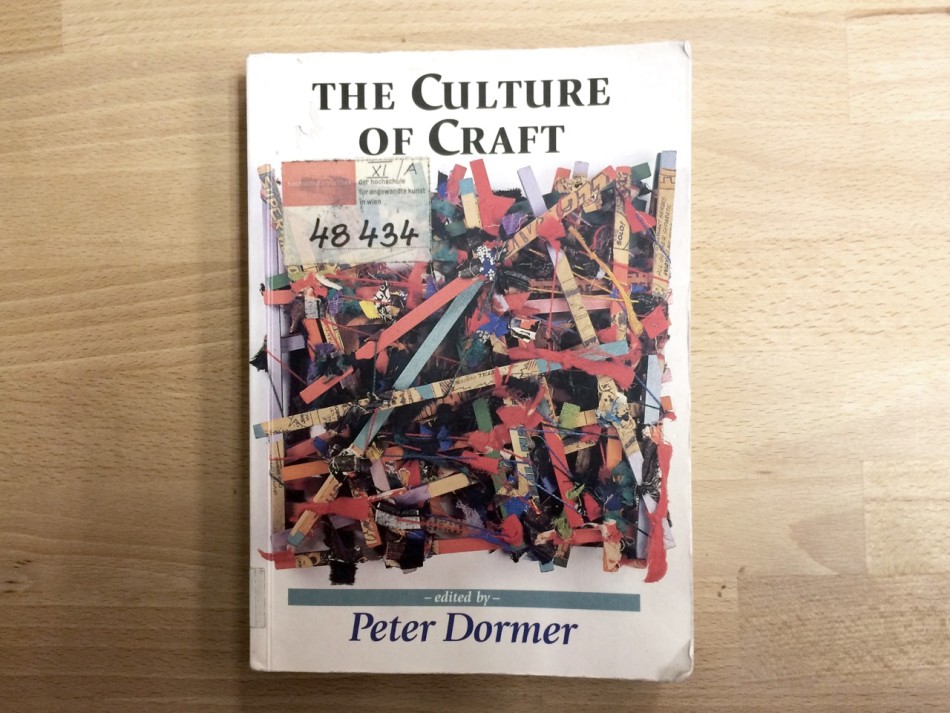
Dormer, Peter (Ed.) The Culture of Craft: status and future. Manchester and New York: Manchester University Press, 1997
The persistence of hand-making as a method of manufacture is one of the most interesting aspects of visual culture in the twentieth centaurs. It is the function of volumes such as the one to make this thrush abundantly clear.
The editor of the texts, Peter Dormer, has long been considered one of the most important thinkers on contemporary craft in the world. Over the last twenty years he published a number of seminal books and articles, curated several vitally important exhibitions and taught thousands of student. There could not have been a more appropriate editor for this project. [Paul Greenhalgh in the foreword of the book]
The book is a collection of essays with dominant contributions form the editor himself.
It starts with an overview about the history of craft by Paul Greenhalgh, including the etymological origins, as well as the activity and practice related developments and changes over time. [1]
In his article called Craft and the Turing Test for Practical Thinking Peter Dormer discusses the nature of craft and defining parameters of craft practices in the face of new technologies. “Suppose one adapted a Turing Test to cover practical thinking. Suppose one cannot tell among a group of similar objects which one is the product of personal know-how and handcraft and which was produced by machine (or through the system of distributed knowledge): then one of the foundations of the status of craft – that it produces things that machines cannot imitate – becomes wobbly. […] If you cannot tell weather a piece of machines textile is hand-done or machines, then either the much-vaunted poetry of the handcraft aesthetic is a myth, or the same poetic aesthetic claimed for handcraft is also achievable through technology, and consequently what technology distributed is not only knowledge but also ‘poetry’. Either way, the special status of craft would collapse.” [2]
The article Textile and Technology focused on the natural affinity between textile crafts, especially weaving and mathematics – the loom and the digital computer. [3]
The Language and Practical Philosophy of Craft chapter talks about the potential difficulties describing the qualities of craft with words. “.. there are many people producing ‘craft’ who do not place the emphasis upon making. Their emphasis is upon ideas that have an existence that, they say, is separate from and not dependent upon making. […] Conceptual crafts exist primarily in words, with the objects acting as symbols or pegs. The goal of such practitioner can be thought out in discussions and in philosophical debate. In non-conceptual craft the thinking is in the making, the connoisseurship in making can only be demonstrated, … [4] The text closes quoting Ludwig Wittgenstein who wrote in 1919 that the cardinal problem in philosophy was the difference between what can be expressed theoretically in propositions – language – and what cannot be expresses theoretically but only shown. What can only be shown cannot be written about, and to those who think there can be a theory and a critical language of craft that is a warning worth heeding. If they do not then they will distort the integrity o the very subject they profess to respect. [5]
–
[1] Greenhalgh, Paul. The history of craft. In: Dormer, Peter (Ed.) The Culture of Craft: status and future. p. 20 – 54
[2] Dormer, Peter. Craft and the Turing Test for practical thinking. In: Dormer, Peter (Ed.) The Culture of Craft: status and future. p. 144f
[3] Dormer, Peter. Textiles and Technology. In: Dormer, Peter (Ed.) The Culture of Craft: status and future. p. 168f
[4] Dormer, Peter. The language and practical philosophy of craft. In: Dormer, Peter (Ed.) The Culture of Craft: status and future. p. 228f
[5] Dormer, Peter. The language and practical philosophy of craft. In: Dormer, Peter (Ed.) The Culture of Craft: status and future. p. 230f